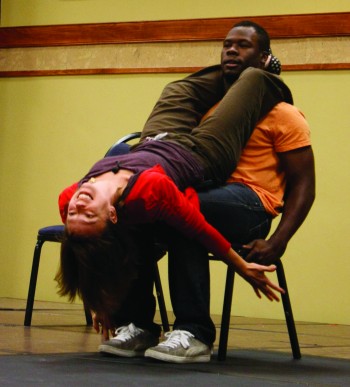
The Student Government Association hosted an interactive event called Sex Signals on Wednesday at 7:30 p.m. in the Curris Center. Sex Signals uses comic improvisation and the participation of audience members to play out various dating and sexual assault scenarios.
Matt Mauschbaugh, junior and lectures chair to the Campus Activities Board from Edwardsville, Ill., said this event also gave SGA the opportunity to promote the Take Back the Night event on September, 25.
“Take back the night is a very serious and heartwarming event which confronts a similar subject to Sex Signals,” he said. “Because this event sheds a comedic light on sexual abuse and rape, I thought this was a good promotional event.”
The predominantly female audience was incorporated into the scenarios as the onstage actors asked listeners to shout out lines or give advice as to how the scenes should play out.
With input from the audience, the actors were able to improvise awkward real life dating situations. Every scene portrayed throughout the hour and a half long event confronted situations ranging from gender stereotypes to the issue of consent versus rape.
Taylor Crum, sophomore and SGA publicity chair for CAB from Chester, Ill., expressed her thoughts on the event.
“It seemed like the actors really reached their audience,” she said. “However I do wish more males would have attended the event because they are more likely to be cast as a suspect in the scenarios.”
The two actors, one male the other female, hyperbolized their subjects by portraying their characters as obvious stereotypes of the masculine male and submissive female.
The male character in each scene was often portrayed as mercurial and potentially dangerous to his female counterpart as he acted like stereotypical masculine male. In contrast, the female character was either portrayed as submissive or vulnerable.
The scenarios, though humorous, presented serious situations that were meant to make college students aware of the potential dangers of dating.
In a scene, which depicted a talk show scenario, the male character played a young man accused of rape and the female character was the talk show host. The male character told an ambiguous story about a sexual situation meant to lead the audience to decide whether or not it was consent.
After the scenario, the actors slowed their pace and turned the scenarios into a didactic discussion about consensual sex and rape. Shortly after, the actors encouraged college students to always consult a school counselor when confronted with a similar situation.
Story by Alex Berg, Staff writer.